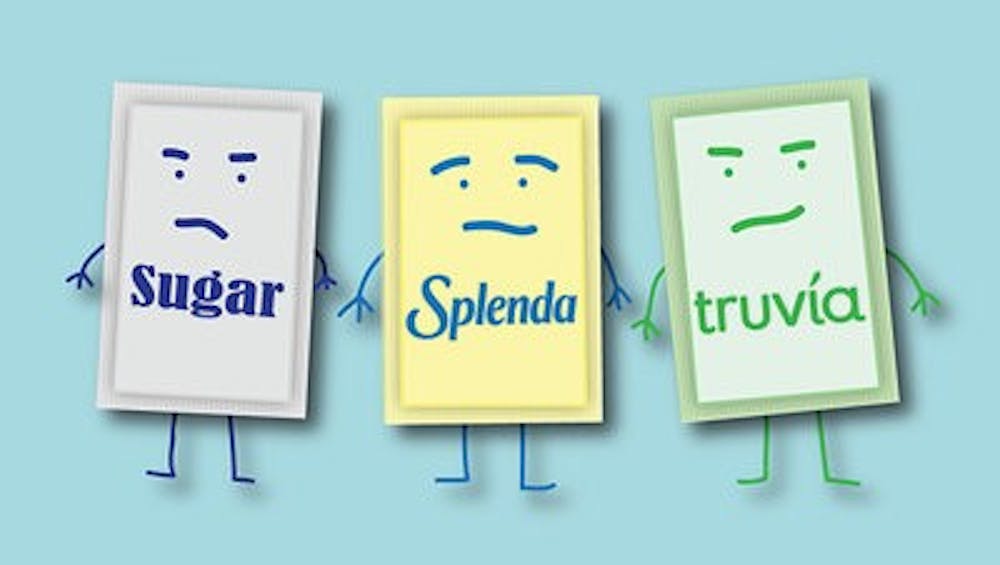Sugar causes diabetes! Diet Coke causes brain cancer! Splenda causes more cancer!
The media shouts these messages at us with every medical spotlight on the news or in a magazine. What do you choose when every choice is going to disease you?
"I started using Splenda right when it hit shelves, so any studies showing negative long-term effects in rats hadn't come out yet," said Elizabeth Segarra, Auburn alumna. "Now sometimes I see studies that Splenda might lead to cancer or leukemia. No one really knows yet. It might seem scary, but compare that to the effects of consuming sugar. Not only does sugar have calories, but it spikes your blood sugar, and it could lead to diabetes. Maybe I will get cancer from Splenda one day. Who knows?"
It's hard to ignore the reported possibility of disease from Splenda use, or any other artificial sweeteners. Leonard Bell, professor in poultry science who has done research on artificial sweeteners, also known as high intensity sweeteners, does recall how previous artificial sweeteners have shown health concerns.
"In the mid-1960s we had two high intensity sweeteners," Bell said. "We had cyclamate and we had saccharin. There's a segment of the population whose intestinal microflora can convert cyclamate into a potential carcinogen, so the government got rid of cyclamate based on that segment of the population."
Bell is confident the modern artificial sweeteners are safe.
"Sugar substitutes need to go through safety testing before they hit the market, so they have undergone various safety tests for the Food and Drug Administration," Bell said.
For the most part, Bell is supportive of artificial sweeteners, particularly in beverages. He says diet drinks are beneficial during meals, when calories will already be consumed via the food.
He does admit, however, there is a chance the calorie-free beverages could make people crave sweets.
According to Bell, the body expects calories when it ingests something sweet, so when someone chooses to drink a diet soda over a sugar-sweetened one, the body sends impulses signaling it needs calories. These signals are known as cravings.
"You know, we have to remember, if we're thirsty in the middle of the day, we could always go with water," Bell said.
Rachael Mesner, program coordinator of Health Promotion for Auburn University's Health Promotion and Wellness Services, encourages drinking water instead of added sugar. If taste is desired, fruit infused water is an option she promotes.
Both Bell and Mesner agree mindful eating is important, whether consuming sugar or alternative sweeteners. Mesner suggests students read nutrition labels, saying they are better labeled than ever. In being mindful, she said students should listen to their cravings, not restrict, but be mindful of their food selections overall.
Terri Sollie, senior in vocal performance, has decided to stop using Splenda due to a side effect.
"If I'm cooking, then I only use real sugar," Sollie said. "I used to use Splenda, but it made me really forgetful. My mom did some research and found out that Splenda causes serious memory and concentration problems for some people."
Bell says people may believe artificial sweeteners are harmful because of many reasons, from misunderstanding to poorly designed studies. He says there are some people who may be jumping to conclusions about their bodies' reactions to artificial sweeteners.
"I think that there are some people who may try a new food product and may end up with a headache or with a stomachache," Bell said. "They look at the product and say it must have been the high intensity sweetener that was in there [causing the headache or stomachache] because they've never had it before."
Although there are people who misunderstand their bodies' cues, there are also people like Sollie who do experience side effects from the artificial sweeteners.
"I think there are some people who are sensitive, but I don't think that justifies removing it from the marketplace," Bell said. "As far as a global ban of high intensity sweeteners, I think that's too extreme. There are many segments of the population that benefit from them."
Diabetics benefit from artificial sweeteners, who are now able to consume sweet foods without sugar.
In addition to artificial sweeteners, there are natural alternative sweeteners such as honey, agave nectar and Stevia. However, Bell cautions against believing the natural "hype" surrounding natural sweeteners such as honey and agave nectar.
"Sugar is derived from sugar cane and sugar beets, so that's derived from natural sources," Bell said. "Honey [is] really the same thing. It's still a sugar source; it's still going to give you the calories. So honey versus granulated sugar, I don't see a big advantage [with] one or the other. [It's the] same thing with agave nectar. If the sugars are there, the sugars are there."
The only advantage, Bell stated, was marketing.
"There's this general perception that 'natural' is better," Bell said. "The thing we have to remember is there are lots of natural substances that aren't good for us. Simply the word 'natural' doesn't mean that it's good for us."
If the sugar from honey and granulated sugar affect the body in the same manner, should we be concerned with Segarra's belief that sugar causes diabetes?
"The sugar's not going to cause diabetes unless you have a lot of weight gain which then triggers, indirectly, the diabetes," Bell said. "There's not been anything that's suggested [Splenda] is cancer-causing. There's probably going to be a higher risk of being in an automobile accident than cancer associated with high intensity sweeteners."
The next time you decide to choose Splenda over sugar, don't panic. In the end, the choice is really up to you. You don't have to decide cancer or diabetes; you just have to choose whether taste or calories matter more.
Do you like this story? The Plainsman doesn't accept money from tuition or student fees, and we don't charge a subscription fee. But you can donate to support The Plainsman.





